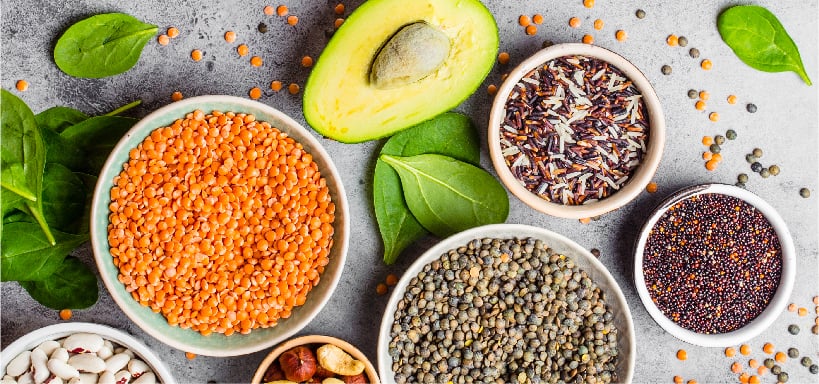Zinc is an essential trace mineral that plays a role in more than a hundred enzymatic reactions in the body, which is why consuming foods high in zinc is so important.
This mineral (along with iron) is needed in small amounts every day in order to maintain your health and perform important functions. Zinc benefits come from its presence within all bodily tissue — it’s needed for healthy cell division, and it acts like an antioxidant, fighting free radical damage and slowing the aging process.
Zinc deficiency is now known to be a major malnutrition problem worldwide, and inadequate intake of zinc is one of the main causes. According to the World Health Organization, millions of people throughout the world may have inadequate levels of zinc in their diets.
In fact, zinc deficiency is ranked the fifth-leading risk factor in causing disease worldwide. It occurs when you don’t have enough sources of zinc in your diet, or you have trouble absorbing zinc due to digestive disorders or very poor gut integrity.
The good news is that if people consume good sources of zinc daily, like the top 17 sources listed below, they can prevent inadequate levels and reap the benefits of this essential mineral.
Foods High in Zinc
Animal products are the best sources of zinc compared to plant foods, like vegetables, because zinc bioavailability (the fraction of zinc that’s retained and used by the body) is high in foods like animal meat and seafood.
Research shows that this is due to the absence of compounds that inhibit zinc absorption in animal sources and the presence of sulfur-containing amino acids that improve zinc absorption, like cysteine and methionine.
Although there are plant-based zinc foods, they’re less bioavailable because of their high content of phytic acid (or phytates), which inhibits zinc absorption. Reports suggest that people who don’t eat meat or animal products, like people on a vegetarian or vegan diet, need up to 50 percent more zinc in their diets daily to absorb what they need.
However, the inhibitory effects of phytic acid on the absorption of zinc can be minimized with methods like soaking, heating, sprouting, fermenting and leavening. Research also shows that the absorption of zinc can be improved by using yeast-based breads and sourdough breads, sprouts, and presoaked legumes.
The best way to achieve optimal zinc levels is to consume two to three servings of these zinc foods per day:
1. Oysters
3 ounces (85 grams) of eastern, wild, cooked oysters contains 51.8 milligrams of zinc (471 percent Daily Value*)
Although eating oysters should not be done more than once in a while, they are particularly high in zinc. Oysters offer a range of nutrients, including protein and antioxidants, but eating them raw may contain bacteria and contaminants, including heavy metals like mercury and cadmium.
There are healthier ways to get zinc into your diet, though, so stick to eating oysters only occasionally.
2. Grass-Fed Beef
4 ounces (113 grams) of grass-fed ground beef contains 5.1 milligrams (46 percent DV*)
Grass-fed beef nutrition includes omega-3 fatty acids and conjugated linoleic acid, a powerful polyunsaturated fatty acid that has been shown to help reduce the risk of heart disease, improve blood sugar, discourage weight gain and build muscle. While red meat is known for its very high zinc content, sticking to healthier options like grass-fed beef is ideal.
3. Beef Liver
3 ounces (85 grams) of cooked beef liver contains 4.5 milligrams (41 percent DV*)
Beef liver contains a bit more calories, vitamin B12, vitamin B6, vitamin A, zinc and phosphorus compared to other types of liver. Cook it up with some grass-fed butter and onions.
4. Lamb
4 ounces (113 grams) of New Zealand leg of lamb contains 3.6 milligrams of zinc (33 percent DV*)
Lamb is a rich source of many vitamins minerals. In addition to zinc, lamb contains vitamin B12, riboflavin, selenium, niacin, phosphorus and iron.
5. Hemp Seeds
3 tablespoons (30 grams) of hulled hemp seeds contains 3 milligrams (27 percent DV*)
Not only are hemp seeds rich in zinc, but they are an excellent source of omega-3 and omega-6 fatty acids. They have been found to cause beneficial effects on your cardiovascular system and help keep inflammation at bay.
READ RELATED: 6 Big Changes You’ll See at Taco Bell This Year
6. Pumpkin Seeds
1 ounce (28 grams) of roasted, unsalted pumpkin seeds contains 2.2 milligrams of zinc (20 percent DV*)
Pumpkin seeds and pumpkin seed oil are a key food for maintaining wellness in post-menopausal women. Pumpkin seeds are also good for the prostate, and they promote your mental well-being.
7. Cashews
1 ounce (28 grams) of raw cashews contains 1.6 milligrams of zinc (15 percent DV*)
Cashews are rich in unsaturated fatty acids and high in protein. Studies indicate that cashews nutrition helps fight heart disease, reduce inflammation, promote healthier bones and support healthy brain function.
These nuts help with weight loss or maintenance because they make you feel fuller and curb food cravings. Plus, cashews have a good zinc-to-copper ratio. This helps ensure that both of these minerals stay in balance.
8. Sunflower Seeds
1 ounce (28 grams) of unsalted, toasted sunflower seed kernels contains 1.5 milligrams of zinc (14 percent DV*)
Sunflower seeds are high in many nutrients, not just zinc. Although there are relatively few calories in sunflower seeds, each serving packs in a serious punch of micronutrients like vitamin E, thiamine, manganese and copper.
9. Lentils
3.5 ounces (100 grams) of cooked, mature, unsalted, boiled lentils contains 1.3 milligrams of zinc (12 percent DV*)
Lentils are known for their beneficial effects. They are rich in polyphenols and micronutrients, including zinc.
Lentils serve as a plant-based protein, making them an excellent zinc-rich food for vegetarians.
10. Turkey Breast
3 ounces (85 grams) of cooked, roasted turkey breast (meat only) contains 1.3 milligrams of zinc (12 percent DV*)
Turkey breast is a high-protein food, packing in more than 25 grams per three-ounce serving. We need protein for just about everything. Not only are our hair, skin and nails made up of proteins, but protein also transports oxygen, aids in blood clotting, and repairs and regenerates tissue cells.
11. Eggs
2 (100 grams) whole eggs contains 1.3 milligrams of zinc (12 percent DV*)
Eggs are rich in nutrients and help protect us against a range of issues, including heart disease, diabetes, macular degeneration and mood disorders. Studies also suggest that eating eggs can help with weight loss.
12. Sardines
1 can (3.75 ounces or 92 grams) of drained Atlantic sardines, canned in oil, contains 1.2 milligrams of zinc (11 percent DV*)
Sardines are packed with important nutrients, securing them a top spot as one of the most nutrient-dense foods on the planet. High in omega-3 fatty acids, protein, vitamin B12 and selenium, sardines in a can are one of the few ingredients on the market that are super healthy, budget-friendly, convenient and delicious.
13. Shiitake Mushrooms
3.5 ounces (100 grams) of shiitake mushrooms contains 1 milligram of zinc (9 percent DV)
Proven mushroom nutrition benefits include the ability to boost immunity due to its antioxidant activities and reduce inflammation.
*Daily Value: Percentages are based on a diet of 2,000 calories a day.
Benefits
Consuming good sources of zinc regularly is beneficial in the following ways:
- Works as a powerful antioxidant: Zinc helps fight oxidative stress and decrease your chances of developing a number of serious diseases. In fact, zinc supplementation significantly lowered infection rates in participants ages 55 to 87 years in a randomized, controlled trial.
- Boosts eye health: Zinc is needed to covert vitamin A into its active form in order to maintain proper vision. Adequate sources of zinc can help improve night vision and more. This is due to zinc’s ability to reduce oxidation and inflammation, which are associated with diminished eye function.
- Enhances immune function: Studies have shown that humans needs zinc to activate T-cells, which are critical for proper immune function. That is why people who are deficient in zinc tend to more susceptible to a variety of illnesses from a weakened immune system, including the common cold.
- Promotes wound healing: Zinc benefits the integrity of the skin and helps treat infections. Research shows that people who have delayed wound healing tend to have low levels of zinc.
- Balances hormones and supports reproduction: Zinc plays an important role in hormone production. It’s needed for the production of estrogen and progesterone in women, and it has shown to to increase testosterone levels and sperm quality naturally. Zinc is also needed to balance insulin, the main hormone involved in the regulation of normal blood sugar.
- Promotes muscle growth and repair: Studies have found that zinc plays a crucial role in cell division and cell growth, so it’s needed to maintain strength in the muscular and skeletal systems. Eating good sources of zinc daily also helps with the release of testosterone, growth hormone and insulin-like growth factor-1, all of which build muscle mass and help you maintain a healthy metabolism.
- Aids in nutrient absorption: Zinc affects protein synthesis and is needed to use amino acids from food. It’s also involved in the breakdown of carbohydrates, which are some of the main sources of energy for humans. This is why a zinc deficiency can lead to low energy levels and contribute to adrenal or chronic fatigue.
- Promotes cardiovascular function: Research has proven that zinc is needed to maintain the health of cells within the cardiovascular system, while also lowering inflammation and oxidative stress.
Conclusion
- Zinc is an essential trace mineral that plays a role in more than a hundred enzymatic reactions in the body. It’s needed for proper cell division, and it acts like an antioxidant, fighting free radical damage and slowing the aging process. It also supports immune system function and helps fight the common cold.
- Zinc deficiency is now known to be an important malnutrition problem worldwide, and inadequate intake of zinc is one of the main causes.
- Most foods high in zinc come from animals, such as oysters, grass-fed beef and lamb, but there are also plant-based foods that contain zinc, including seeds and lentils.
- Eating enough zinc boosts immunity, reduces inflammation, fights oxidative stress, supports the heart, promotes muscle growth and helps balance your hormones.
!function(f,b,e,v,n,t,s)
{if(f.fbq)return;n=f.fbq=function(){n.callMethod?
n.callMethod.apply(n,arguments):n.queue.push(arguments)};
if(!f._fbq)f._fbq=n;n.push=n;n.loaded=!0;n.version=’2.0′;
n.queue=[];t=b.createElement(e);t.async=!0;
t.src=v;s=b.getElementsByTagName(e)[0];
s.parentNode.insertBefore(t,s)}(window, document,’script’,
‘
fbq(‘init’, ‘3475171552810057’);
fbq(‘track’, ‘PageView’);




